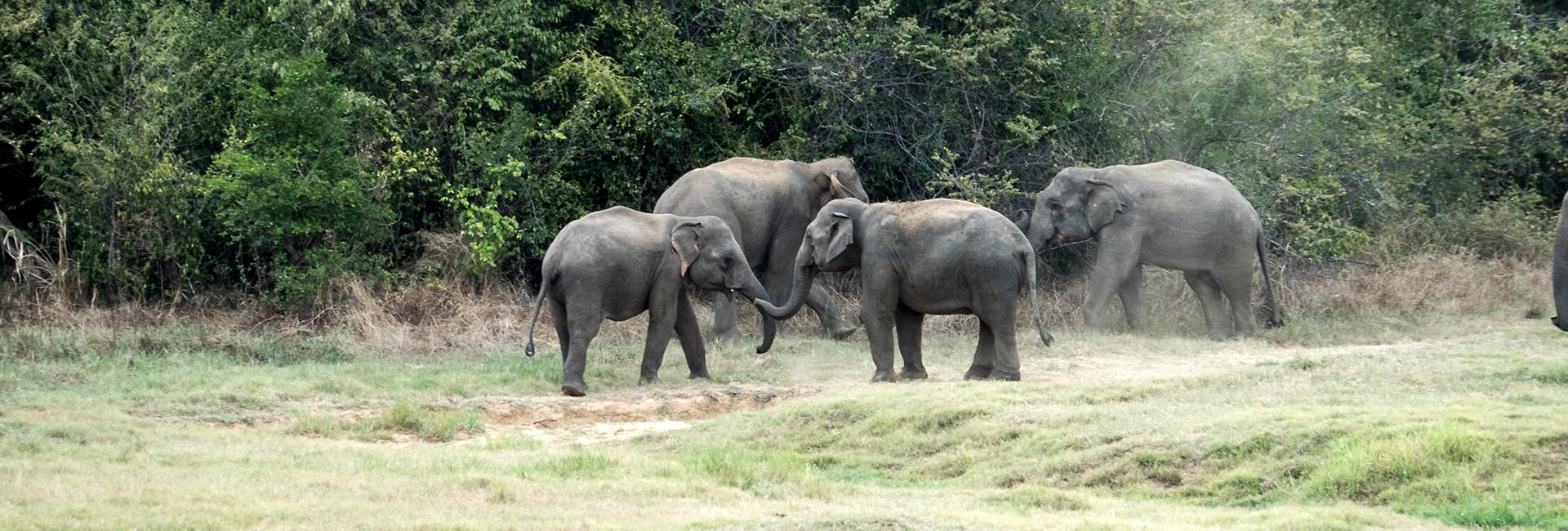There are still spaces this summer for you to volunteer with elephants in Sri Lanka on The Great Elephant Project. Between now and September, it is a critical time for those at the project site and hear is why…
The Dry Season
As Sri Lanka is heading into its dry season, then comes the time where human elephant conflict increases. As you are probably aware, elephants are herbivorous, consuming up to a whopping 150 kilograms of plant matter a day! Experts suggest that local elephants feed on 116 plant species, 19% of which is grass. The dry season comes with a lack of rain of course, which means the abundance of available food sources for the giants is decreased.
Human Elephant Conflict (HEC)
It is cited that since 1950 at least 4,200 elephants have sadly perished as a direct result of HEC in Sri Lanka, and during the last 12 years alone, 1,464 elephants and 672 humans have also been killed. With the depletion of the elephant habitat, and consequently sporadic food and water supplies (massively intensified by the dry season) means that elephants wander into newly cultivated lands that was once their former habitat in search for food. These cultivated lands are now the homes of villages and communities, within which locals store their foods in their homes.
Whilst some communities have been somewhat elephant–proofed with electric fences, the elephants can often break through these, causing detrimental damage. Of course, with their enormous size, and equally large appetites, a single ele could destroy the entire cultivation of a farmer in one night, and do themselves some damage in the process too.
How Could I Help As A Volunteer?
Taking into consideration the dry season, and highly increased HEC occurrences at this time, your help as a volunteer with the Sri Lankan elephants at The Great Elephant Project this summer will be of great importance.
We informed you earlier on this week of Mama, whose house was eleraided and significantly damaged as a result. Mama’s story is just one of many throughout local villages in Sri Lanka, and while there are some solutions, they are expensive and not 100% fool proof.
As a volunteer this summer, you will be contributing to the repair and purchase of electric fences for the villages as a deterrent to the extraordinary creatures (this however brings them no harm). The alternative could be relocating entire villages, which is hugely time consuming, very expensive and just plain unrealistic. A longer-term solution is building elephant proof food stores for the villages, but this is again very expensive, so your contribution as a volunteer in Sri Lanka will help raise funds to support such projects that benefit both humans and elephants.
The dry season is also a crucial time for conducting the project’s elephant foraging study to help further avoid HEC. It is crucial for the team at the project site with the help of generous volunteers, to monitor and record data on what plant life the elephants are munching away on during the dry season, so the team can keep the areas with provision of these sources protected. Villagers tend to set fire to forests during dry season, to replenish the land for their cattle and shifting crop cultivation. Therefore, in coalition with the study, you will also work with the team to monitor the already established sustainable land use and livelihood projects within the local community, to try and prevent them from setting such fires. Additionally, volunteers will assist in conducting surveys of homes and fields that have been attacked to gather information to understand the nature of the attacks and damages that were caused (types of crops, storage methods), and even if the elephants are identifiable from the accounts of the villager. This way it’s easier to spot patterns of whether particular ele’s are being particularly naughty! This gives you a once in a life time chance to experience the heart of local Sri Lankan culture as you are immersed within it, and helping to evolve their ways of life for the better.
This season also causes large herds of elephants to migrate to the most fruitful water supplies, which tends to be around the project’s WG Tank where several other activities are conducted to support elephant conservation in Asia.
 Some of these include;
Some of these include;
-
Identifying individual elephants
This helps to keep track of how many elephants are in the area and are able to spot when new additions wander in, but also to monitor the individual circumstances of each ele. Many elephants often come into the project site not with the greatest health, so knowing who is who and any conditions the team needs to monitor increases the chances of successfully conserving the species. -
Behavioural Monitoring
Better understanding the elephants helps the team to know what is going to be the most appropriate approach to take in conserving these graceful giants. For example, understanding their movements can help to predict where they will go next, and whether they will come into any conflict with humans on the way.
As you can see, The Great Elephant Project is desperate for volunteers in the coming months. There are just 35,000 - 45,000 Asian elephants that remain in the wild and it s crucial these mountainous beauties are preserved. If you want to explore Sri Lankan Asia, and get a taste of something extraordinary (a huge ele that weighs tons, walking right in front of your truck!) then you can enquire online or give us a call.




















